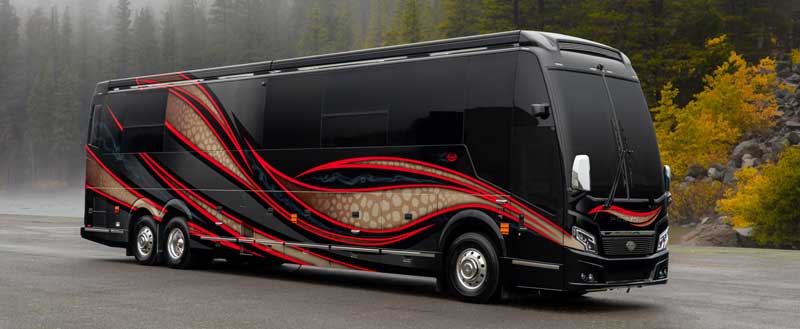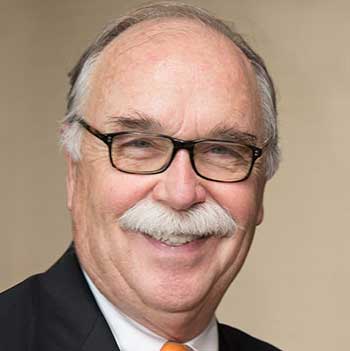Photos by and reproduced with permission: Marathon Coach.
Owners of luxury motor coaches and RVs, such as Marathon Coaches and other high-end brands, can have the best of both worlds: a vacation with all the comforts of home, and an opportunity to shape their philanthropic legacy that also provides a current charitable tax deduction.
Luxury RVs and motor coaches generally qualify as second homes under IRS guidelines because they contain kitchens, bedrooms and bathroom components. This means their owners may gift their coach to a qualified charity in the form of a Retained Life Estate (RLE).
Here’s How It Works
Just like a traditional gift of real estate, a Retained Life Estate gift requires that the vehicle’s title be passed to the charity. The donor must first have a qualified appraisal completed on the RV to establish its fair market value at the time of transfer. The difference between that value and the estimated remaining life use value will be used to project the donors’ available charitable tax deduction.
For as long as the donor uses the RV, they are contractually required to pay registration fees, property taxes, utilities, maintenance, and insurance (naming the charity as co-insured).



A Bevvy of Benefits
The charitable world should explore this non-traditional gift form, because it represents a powerful asset:
- The value of used coaches ranges from $500,000 to $2,800,000.
- There are no holding costs or limited ownership risks if structured correctly
- Other charities haven’t yet connected the dots, so competition for these gifts is low.
- This is a flexible gift. Other gift options for luxury RVs include:
- Donor Advised Fund
- Creating either a Charitable Gift Annuity
- Bargain Sales
- Split interest gifts
- Luxury RV owners can enjoy substantial tax benefits from their gift.
Talk to your board and legal team today to see if accepting luxury RVs is right for your nonprofit. If not, your inaction will drive prospects to seek other charities that will accept this nontraditional gift form.

Points to Ponder
Expanding on the topic of donating luxury motor coach can provide a further comprehensive understanding for both donors and charitable organizations.
Donor Motivations and Benefits
Owners of luxury motor coaches often seek ways to align their assets with philanthropic goals. There could be other assets they are considering. Donating such vehicles can offer significant tax advantages including significant charitable deductions. Beyond financial incentives, however, donors may find personal fulfillment in supporting the causes they care about the most and knowing that their contributions make an impact in the world for generations to come.
Charitable Organization Considerations
For charities, accepting luxury motor coach donations involves several key steps:
- Valuation and Appraisal: It’s critical to obtain a qualified appraisal to determine the vehicle’s fair market value (FMV), ensuring accurate tax reporting and compliance.
- Legal and Tax Compliance: Proper legal documentation, including transfer of title and acknowledgment receipts, is a must. Charities have to also adhere to IRS regulations regarding non-cash contributions.
- Maintenance and Upkeep: Until the vehicle is sold or utilized, the charity is responsible for its maintenance, insurance, and storage, which can incur additional costs.
Case Studies or Examples
Consider the example of the donor above who gifted a $1.5 million luxury motor coach to a nonprofit organization. The donor received a charitable deduction based on the appraised value, while the charity sold the vehicle and used the proceeds to fund its programs. This mutually beneficial arrangement showcases the potential advantages for both parties.
Potential Challenges and Solutions
Challenges in luxury motor coach donations may include:
- Valuation Disputes: Differences between donor expectations and appraised values can arise. Engaging a certified appraiser and maintaining transparent communication can mitigate these issues.
- Maintenance Costs: The charity may face unexpected expenses related to the upkeep of the vehicle. Establishing a clear agreement regarding responsibility for these costs before accepting the donation is advisable (and it is good practice for donor relations).
Marketing and Outreach Strategies
Charities can attract potential donors by:
- Targeted Campaigns: Developing marketing materials that highlight the benefits of donating luxury motor coaches, including tax advantages and the impact on the charity’s mission.
- Partnerships: Collaborating with luxury vehicle dealerships and owners’ clubs to reach individuals who may be interested in making such donations.
By addressing these aspects, both donors and charitable organizations can navigate the process of luxury motor coach donations effectively, ensuring a beneficial outcome for all involved.







Thank you, Chase, for submitting this article. You are always on the cutting edge.
Chase,
Great article! It is insightful and innovative. It will provide charities with a new approach to attract legacy gifts from their donors.
Chase, thanks so much for sharing, and offering yet another way a nonprofit organization can reach out to their donors and offer yet another way to support the charity of their choice. The owners of these vehicles are highly likely to have disposable income and are more likely to be philanthropic. These are gifts that I’d assume no charity has on their radar to ask for. This can be another substantial gifting source for a charity, if they are open to new sources of gifting and asking. Cudos to you!!!
Assuming this can be done as a Simultaneous Closing as well?
Nonprofits need to wake up. Chase has a way of moving the needle.
My biggest question is about the character of the asset. Real Estate is an appreciating asset, such that people who bought starter homes 50 years ago for $25,000 have assets worth between $300,000 $ $2,000,000 (just broad guesses on my part). Will these motor coaches mature and grow in value in the same way? If not, then the gifts make sense and pass the IRS tests, but they might be very disappointing to charities at the end of a RLE & especially a CGA.
These coaches depreciate as they get used. Let’s say the prospective donor purchased a coach for $2,750,000. And it now has a value of $1,500,000. Wouldn’t such a donations still be a home run for the charities. Reality Gift Fund will take ownership to help facilitate an outright gift or accommodate a donation meant to fund a donor advised fund or a bargain sale. CGA funding can be accomplished with a simultaneous closing. No risk to charity for fully funded gift arrangement and if the coach doesn’t sell at a price to fully fund the CGA, the donor can walk away from the gifting arrangement. As can the charity.